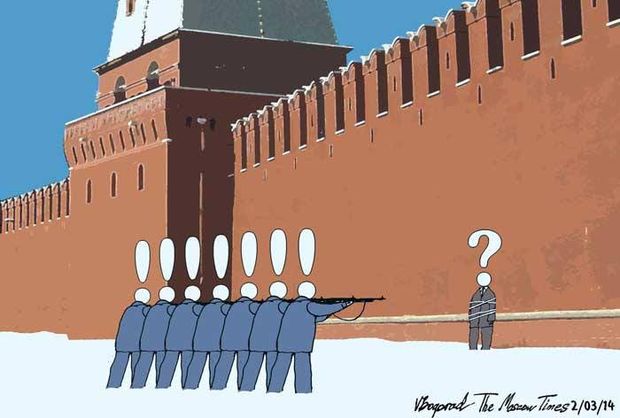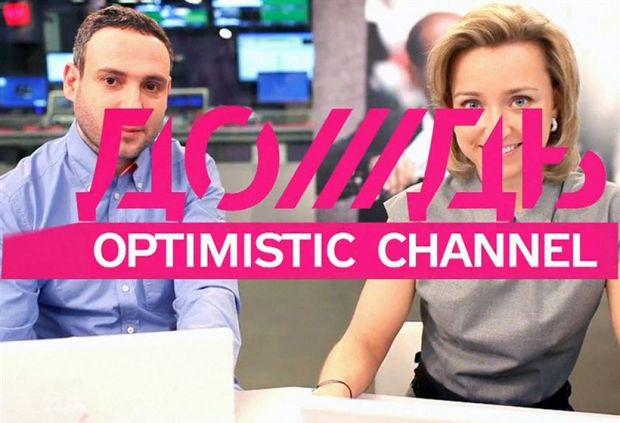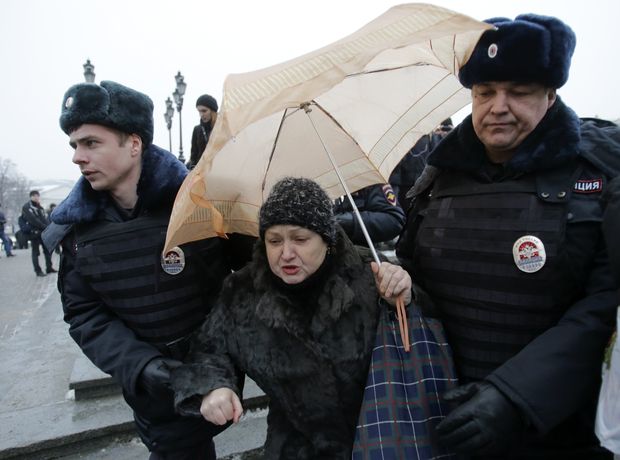Non-optimistic reality of an “optimistic channel”
Three versions of why the future of an opposition Russian TV channel Dozhd remains under question
Passions have been running high around TV channel Dozhd for two weeks. The scandal was provoked by the inappropriate, as the majority of Russians think, question which sounded “Wouldn’t it be better to surrender Leningrad to save hundreds of thousands of lives?” It was voiced during a historical show “Dilettantes” and published on the website a few days before the celebration of the 70th anniversary of the complete lifting of the German blockade of Leningrad. The question caused a wave of outrage from Russian intellectuals and bloggers. For example, Russian literary critic, publicist, and TV host Aleksandr ARKHANGELSKY wrote in social networks: “I have no nice words for Dozhd’s poll on the eve of the blockade anniversary. It is the same as to come to a man’s funeral and playfully ask his widow and grandchildren whether it would not have been better if he had opened the door: maybe, he would not have been murdered then.”
Councilors of the Saint Petersburg Legislative Assembly immediately filed an appeal to the Prosecutor General with a request to investigate the publishing of “provocative material on the Dozhd website, give it a legal assessment, and take appropriate action, up to closing the channel down” (information courtesy of NEWSru.com). The management of the channel apologized and removed the poll. On Thursday, January 30, the TV station’s CEO Natalia SINDEEVA was the key newsmaker on Dozhd’s website. In an interview she offered her excuses for what had happened: “I would like to apologize to everyone who was offended by the question, such people were even among our station’s staff, and we have extensively discussed the matter.” Later, editor-in-chief and co-owner of the radio station Echo of Moscow Aleksei VENEDIKTOV announced an agreement with Sindeeva concerning transferring the “Dilettantes” from Dozhd to Radio Echo. Perhaps, the channel was trying to find a way out of the situation with the least damage possible. However, it failed to stop the chain reaction, prosecutor’s check has already been launched, and Russian media providers started scraping the channel off their broadcasting lists.
One by one, Dozhd was disconnected by such cable TV operators as NTV+, Akado, Rostelekom, and Dom.ru. Such policy outraged these companies’ subscribers, who had paid to watch Dozhd along with other channels. In particular, Russian writer Dmitry Lipskerov wrote an appeal to the CEO of NTV+, which said that the operator had violated the Law “On Mass Media” and their contract promising that subscribers shall be informed one month in advance before a channel broadcast is cancelled. Also, Lipskerov said that “according to the codes and laws of the Russian Federation, the operator’s actions may be interpreted as infringement of the law, namely arbitrariness.”

Screenshot from youtube
Perhaps, from the legal point of view the operators’ actions can be called arbitrariness, but is it so in reality? Journalists state there was a political order to disconnect the channel.
“Providers had a right to stop broadcasting only if a contract between an operator and a channel was not signed. As far as I know, the majority of providers signed such contracts, therefore, it was a political order,” says Semen NOVOPRUDSKY, independent journalist, Moscow. “Basically, there were no legislative grounds for the disconnection. The order to disconnect was most likely given by the Presidential Administration, because just before it happened, Yuriy Pripachkin, president of the Association of Cable Television of Russia, said that he, as a citizen, would disconnect that channel. The public opinion decoded his words as a command given to a person, who otherwise never voices his own choices over TV channels. I think Dozhd had no idea that such reaction would follow. In general, the current situation in Russia is such that no one can predict what will irritate the government.”
But what was the real reason for the channel’s disconnection? Wasn’t it an attempt on critical thinking and deviation from historical pro-imperial cliches? Because among all other things, there are a lot of historical programs on Dozhd that do not show Soviet film chronicles, but ask questions themselves. They are very inconvenient for the government, which cannot let them stir up the minds.
“Of course, Dozhd irritates the government. It is clear the regime would like to prune everyone,” says Vladimir KORSUNSKY, editor-in-chief, Grani.ru. “I think that it was not so much the question itself as the citizens’ answers to it that caused the attack on the channel. Those who watched the show say they were surprised by the numbers: 54 percent of viewers voted for surrendering Leningrad. I am convinced people must ask the most uncomfortable questions. It is clear that Hitler, who treated these people like enemies, wanted to destroy everyone, to clear the territory for himself. But Stalin did not treat these people any better by forbidding them to leave the city. The government could not but understand that such a reaction to this poll was a reaction to them, to their indifference for people in Russia. This question showed that the current government still treats people in Stalin’s way. There is plenty of evidence of that: Nord-Ost, Beslan, the submarine Kursk, blown up apartment blocks, and so on. It is not the theme of war that is tabooed in Russia, but the truth about war. And the person who talks about this is very important also. For example, Uliana Skoybeda [Russian journalist, famous for her xenophobic views. – Author] openly regretted in her publications in Komsomolskaya Pravda that Nazis had failed to burn all the Jews – and no sanctions were imposed on her after this. This is not censorship, and not even selective censorship, it is the building of a totalitarian society. What is trying to go beyond the boundaries, is being shoved back in.”

FEBRUARY 8, 2014. POLICE DETAIN A PARTICIPANT DURING A PROTEST AGAINST THE THREAT OF CLOSURE TO TELEVISION STATION DOZHD (TV RAIN) IN MOSCOW / REUTERS photo
Indeed, some Russian experts think that the questionnaire is just a pretext to pressurize the TV station. Arkhangelsky wrote about this: “Using this poll as a pretext to destroy the channel is not just a base trick, it is a base trick raised to the level of principle, because the question about the blockade does not hurt the destroyers. Instead it offers them a handy opportunity in their political business, because they do not give a damn about the blockade. They care even less than the authors of the questionnaire.” This means that these limitations should be viewed as censorship. According to Article 16 of the Law “On Mass Media,” “The activity of mass media can be stopped or suspended only after a corresponding decision of its founder, or by court in civil litigation initiated by a registering body.”
As for the prosecutor’s check, ITAR-TASS informs that so far only prosecutor’s senior PR assistant Marina Nikolaeva has spoken on this matter: “We do not exclude that in this case extremism might be involved.” Accusation of extremism is very convenient for the government, since the definition of this notion is very vague and all kinds of statements can fit it. Besides, Dozhd has already been charged with extremism.
“On September 6, 2013, a message appeared that Dozhd’s website was to be blocked in Moscow oblast. The investigatory department of the Interior Ministry had allegedly initiated criminal proceedings against Dozhd on the charges of extremism,” Novoprudsky recollects. “Remarkably, this very department stated there was no case. But this message appeared on the eve of Moscow gubernatorial elections.”
Mikhail ZYGAR, Dozhd’s editor-in-chief, also considers the poll to be a pretext for shutting down the dissenters. “We understand that a campaign against us was launched. Our ill-wishers are trying to ascribe us thoughts and views that we have nothing to do with. Of course, you know that Dozhd has always been consistently condemning Nazism and fought the attempts to justify it. The outburst of negative PR in our direction is a consequence of a political order. This is not the first campaign of this kind: a month ago the same group tried to accuse us of sympathizing with Doku Umarov [terrorist. – Author], an attempt which was both groundless and unsuccessful. We are sure our viewers will not react to the provocations and will not believe the false accusations against us,” wrote Zygar in his blog. He is even more radical on his personal Facebook page: “I thought it was impossible to shut us down because our viewers would stand up for us. Or our colleagues. Well, a lot of people. It is impossible to shut us down indeed, because there is no legal grounds for that. However, Dmitry Peskov [press secretary to the president of Russia. – Author] said that we had ‘violated something bigger than a law.’ And since the law does not allow shutting us down, it becomes possible according to the criminal underworld rules.”
As the pieces fit into the puzzle, it becomes clear that the poll is a mere cover for political games. Dozhd did not suffer any loss of reputation. On the contrary, a lot of Russians called to boycott cable TV operators and started buying pre-paid subscription to Dozhd on the web. But in the financial sphere, this revenue is just a drop in the sea. The channel did not receive much from operators either, the lion share of income was provided by advertisement. But if Dozhd is not broadcast on TV, it will lose almost a third of its audience (according to iKS Consulting), and therefore, advertisers will eventually abandon it.
The channel’s relations with the government are obviously complicated,” Novoprudsky says. “The board and investors are known to be on good terms with Dmitry Medvedev. It is rather a drawback than an advantage for them. Of course, Dozhd is the most oppositionist channel in cable networks, but on the other hand, it cannot be called radically oppositionist. For example, two years ago the station was actively trying to get on the list of nationwide broadcast channels. This is impossible to achieve without big money and relations with the government. But of course, the channel annoys many.”
How did Dozhd displease the government? There are various versions. For example, the escalation of the situation to a scandal is accounted for by the fact that Dozhd had implemented paid subscription for its web content. Also, some journalists assume that the orders from above were triggered by oppositionist Alexei Navalny publishing data about luxurious, palatial villas owned by a number of high-ranked Yedinaya Rossiya (United Russia) MPs. These data were as a basis for Dozhd journalists’ own investigation, whose results were discussed in the show “And so on.” Sindeeva believes in this version.
However, there is a private theory which is so far only discussed in Russian media community’s social networks. According to this theory, Dozhd was to be sold, but the buyer thought the price was too high. Meanwhile, a station that is not broadcast on cable TV can be bought much cheaper.
Time will tell whether the channel will be shut down, sold, or left alone. However, today the situation with Dozhd shows that even a modicum of critical thinking on Russia’s television does not go unnoticed and is blocked. The situation on Ukraine’s television is so far slightly better. But for how long?






